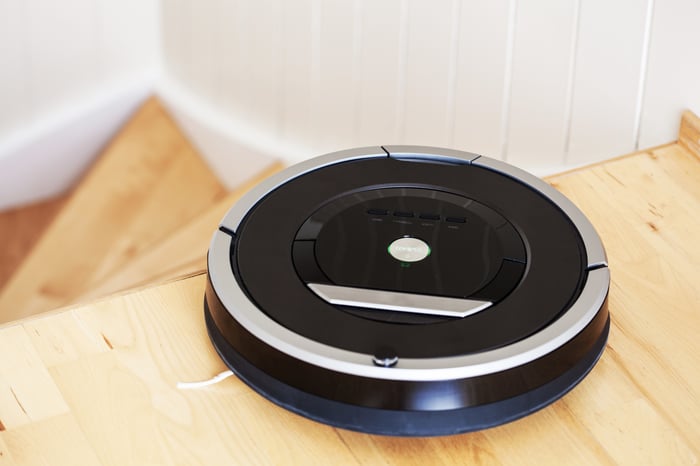Every day, Wall Street analysts upgrade some stocks, downgrade others, and "initiate coverage" on a few more. But do these analysts even know what they're talking about? Today, we're taking one high-profile Wall Street pick and putting it under the microscope...
Last month's upgrade of iRobot (IRBT -0.14%) stock did not go according to plan.
Nearly one month back, equity researcher Sidoti & Co. upgraded the once fast-growing robotic vacuum maker, calling it a "compelling" buy at the then-current share price below $62. But instead of going up, iRobot has gone down -- slipping under $58 a share, in fact, earlier this week.
But now investment banker Merrill Lynch is chiming in. In an initiation reported by TheFly.com today, the analyst makes the case for iRobot having a "relatively attractive" valuation, and being worth...maybe not the $82 that Sidoti posited a month ago, but at least $70 a share.
If Merrill Lynch is right about that, investors could still stand to make a cool 13% profit on the stock (iRobot is up nearly 4% and closing on $62 now, in response to the upgrade). But is the analyst right?
Let's take a closer look.

Image source: Getty Images.
A buy thesis for iRobot
iRobot stock trades for 20.5 times earnings today, and about 19.6 times what the company is expected to earn next year, but Merrill Lynch takes issue with that estimate.
Describing investor sentiment on the company as "relatively negative," the analyst is actually optimistic about earnings next year, predicting that as that pessimism weighs on the stock, earnings estimates will come down. That could enable iRobot to beat estimates and "surprise positively," making the stock's valuation look "relatively attractive" at today's price.
What could cause that to happen? StreetInsider.com, which also covered Merrill Lynch's note, points out that anything from an improved U.S.-China trade relationship, to tariff exemptions, to more consumer spending could enable iRobot to surpass expectations.
iRobot's sine qua non
Of course, if you ask me, the single factor most important to iRobot's success as a stock in the near term will be that first one (or two): eliminating the drag that America's trade war with China has imposed upon the company.
As I explained back in August, tariffs have a terrible effect upon iRobot's import business, artificially inflating revenue by raising the price of its products. This depresses unit sales (one of the things Merrill Lynch hopes will improve). True, at the same time as the total number of Roombas sold gets pinched, absolute revenue may still rise, but that's only because each imported Roomba gets more expensive. That makes it increasingly difficult for iRobot to compete with robotic vacuum manufacturers such as Shark, at the same time as those rivals increasingly win praise for their quality from buyer guides such as Consumer Reports.
Meanwhile, the extra (tariff) money from each Roomba sold goes not to iRobot, but to the U.S. Treasury. And because of that, rising revenue doesn't necessarily translate into rising profits -- which actually declined 31% last quarter despite revenue increasing 15%!
The upshot for investors
The good news is that last week, CNN reported the waiver of tariffs on "hundreds" of Chinese-made consumer goods and noted that trade relations between the U.S. and China are "improving." If robotic vacuum cleaners make it onto the exempt list, that could give iRobot a much-needed reprieve, and improve the chance that Merrill Lynch will be proven right to recommend that stock.
That being said, with iRobot still generating only about $34 million in annual free cash flow, or less than half its reported earnings as calculated according to generally accepted accounting principles (GAAP), I'm going to reserve judgment on whether this news is good enough to justify giving iRobot stock a buy rating.
First, let's look for confirmation that iRobot's products, in particular, will receive tariff relief -- and that this results in an increase in profitability. Then let's see if the tariff exemption sticks, or just gets reinstated again in the next battle of this never-ending trade war.




